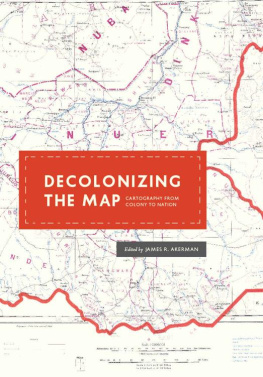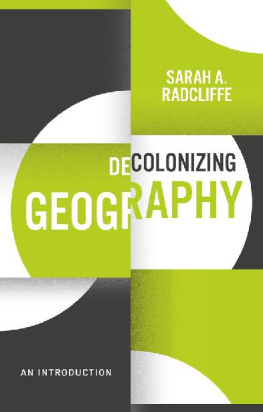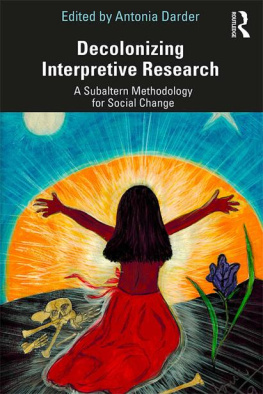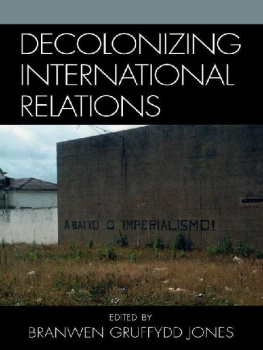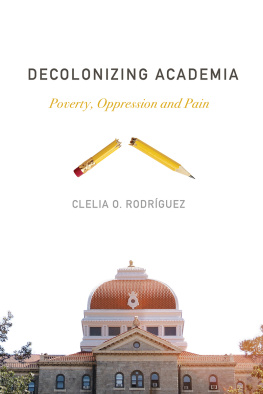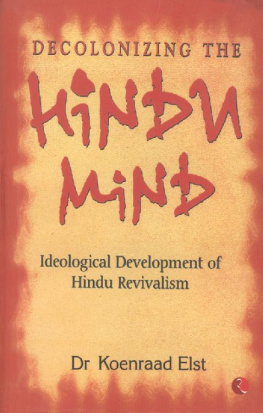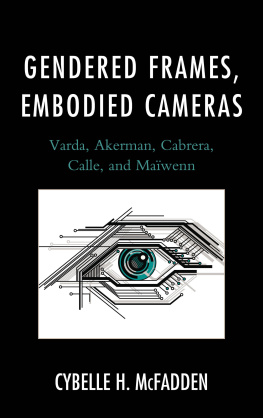James R. Akerman - Decolonizing the Map
Here you can read online James R. Akerman - Decolonizing the Map full text of the book (entire story) in english for free. Download pdf and epub, get meaning, cover and reviews about this ebook. year: 2017, publisher: University of Chicago Press, genre: Politics. Description of the work, (preface) as well as reviews are available. Best literature library LitArk.com created for fans of good reading and offers a wide selection of genres:
Romance novel
Science fiction
Adventure
Detective
Science
History
Home and family
Prose
Art
Politics
Computer
Non-fiction
Religion
Business
Children
Humor
Choose a favorite category and find really read worthwhile books. Enjoy immersion in the world of imagination, feel the emotions of the characters or learn something new for yourself, make an fascinating discovery.
- Book:Decolonizing the Map
- Author:
- Publisher:University of Chicago Press
- Genre:
- Year:2017
- Rating:5 / 5
- Favourites:Add to favourites
- Your mark:
- 100
- 1
- 2
- 3
- 4
- 5
Decolonizing the Map: summary, description and annotation
We offer to read an annotation, description, summary or preface (depends on what the author of the book "Decolonizing the Map" wrote himself). If you haven't found the necessary information about the book — write in the comments, we will try to find it.
Decolonizing the Map — read online for free the complete book (whole text) full work
Below is the text of the book, divided by pages. System saving the place of the last page read, allows you to conveniently read the book "Decolonizing the Map" online for free, without having to search again every time where you left off. Put a bookmark, and you can go to the page where you finished reading at any time.
Font size:
Interval:
Bookmark:
THE KENNETH NEBENZAHL, JR., LECTURES IN THE HISTORY OF CARTOGRAPHY
PUBLISHED IN ASSOCIATION WITH THE HERMON DUNLAP SMITH CENTER FOR THE HISTORY OF CARTOGRAPHY, THE NEWBERRY LIBRARY
Series Editor, James R. Akerman
ALSO IN THE SERIES
Maps: A Historical Survey of Their Study and Collecting
by R. A. Skelton
Five Centuries of Map Printing
by David Woodward
British Maps of Colonial America
by William Patterson Cumming
Mapping the American Revolutionary War
by J. B. Harley, Barbara Bartz Petchenik, and Lawrence W. Towner
Art and Cartography: Six Historical Essays
edited by David Woodward
Monarchs, Ministers, and Maps: The Emergence of Cartography as a Tool of Government in Early Modern Europe
edited by David Buisseret
Rural Images: Estate Maps in the Old and New Worlds
edited by David Buisseret
Envisioning the City: Six Studies in Urban Cartography
edited by David Buisseret
Cartographic Encounters: Perspectives on Native American Mapmaking and Map Use
edited by G. Malcolm Lewis
The Commerce of Cartography: Making and Marketing Maps in Eighteenth-Century France and England
by Mary Sponberg Pedley
Cartographies of Travel and Navigation
edited by James R. Akerman
The Imperial Map: Cartography and the Mastery of Empire
edited by James R. Akerman
Ancient Perspectives: Maps and Their Place in Mesopotamia, Egypt, Greece, and Rome
edited by Richard J. A. Talbert
EDITED BY JAMES R. AKERMAN
THE UNIVERSITY OF CHICAGO PRESS
Chicago and London
The University of Chicago Press, Chicago 60637
The University of Chicago Press, Ltd., London
2017 by The University of Chicago
All rights reserved. No part of this book may be used or reproduced in any manner whatsoever without written permission, except in the case of brief quotations in critical articles and reviews. For more information, contact the University of Chicago Press, 1427 E. 60th St., Chicago, IL 60637.
Published 2017.
Printed in the United States of America
26 25 24 23 22 21 20 19 18 17 1 2 3 4 5
ISBN-13: 978-0-226-42278-7 (cloth)
I SBN-13: 978-0-226-42281-7 (e-book)
DOI: 10.7208/chicago/9780226422817.001.0001
Library of Congress Cataloging-in-Publication Data
Names: Akerman, James R., editor.
Title: Decolonizing the map : cartography from colony to nation / edited by James R. Akerman.
Other titles: Kenneth Nebenzahl, Jr., lectures in the history of cartography.
Description: Chicago : The University of Chicago Press, 2017. | Series: Kenneth Nebenzahl, Jr., lectures in the history of cartography | Includes bibliographical references and index.
Identifiers: LCCN 2016030112 | ISBN 9780226422787 (cloth : alk. paper) | ISBN 9780226422817 (e-book)
Subjects: LCSH: CartographyPolitical aspects. | Decolonization.
Classification: LCC GA108.7 .D44 2017 | DDC 526dc23 LC record available at https://lccn.loc.gov/2016030112
 This paper meets the requirements of ANSI / NISO Z39.481992 (Permanence of Paper).
This paper meets the requirements of ANSI / NISO Z39.481992 (Permanence of Paper).
JAMES R. AKERMAN
Cartography and Decolonization
RAYMOND B. CRAIB
Entangled Spaces: Mapping Multiple Identities in Eighteenth-Century New Spain
MAGALI CARRERA
Cartography in the Production (and Silencing) of Colombian Independence History, 18071827
LINA DEL CASTILLO
Democratizing the Map: The Geo-body and National Cartography in Guatemala, 18212010
JORDANA DYM
Uncovering the Roles of African Surveyors and Draftsmen in Mapping the Gold Coast, 18741957
JAMIE MCGOWAN
Multiscalar Nations: Cartography and Countercartography of the Egyptian Nation-State
KAREN CULCASI
Art on the Line: Cartography and Creativity in a Divided World
SUMATHI RAMASWAMY
Signs of the Times: Commercial Road Mapping and National Identity in South Africa
THOMAS J. BASSETT
The eight chapters in this volume were originally presented as the Seventeenth Kenneth Nebenzahl, Jr., Lectures in the History of Cartography at the Newberry Library in late 2010. Throughout the books gestation, the authors have exhibited exemplary forbearance and have responded to repeated editorial requests both cheerfully and constructively. The editor wishes to acknowledge in particular the unusual amount of effort the authors expended in obtaining images and permissions for the books complex illustration program. Several anonymous readers offered invaluable critiques and timely advice on both the substance and the structure of the volume, while giving us the confidence to move forward. The University of Chicago Press has been unwavering in their support for this project, and its staff both collegial and professional at every turn. The enduring material and moral support of the Newberry Library, the host of the Nebenzahl Lectures since 1966, is foundational. Without this extraordinary community of creative librarians, curators, teachers, and readers dedicated to free inquiry in the humanities, there would be no Nebenzahl Lectures. In the autumn of 2016 the Nebenzahl Lectures celebrated their fiftieth anniversary. This collection is dedicated to Ken and Jossy Nebenzahl in honor of their kind and enduring sponsorship of this series and the scholarship it has promoted.
James R. Akerman
The idea for the Seventeenth Kenneth Nebenzahl, Jr., Lectures in the History of Cartography (2010), Mapping the Transition from Colony to Nation, the basis for this book, emerged from the Fifteenth Nebenzahl Lectures, The Imperial Map (2004), published under the same name by the University of Chicago Press in 2009. The Imperial Maps broad, if episodic, examination of how modern imperial powers used mapping to conquer and manage their colonies and to promote and affirm their imperial identities, as well assomewhat antitheticallyits contemplation of the limits of imperial mapping suggested an obvious counterpoint and successor. This volume publishes the result. At the simplest (and titular) level it considers the roles mapping has played in the passage from colony to nationor, if you will, from dependent to independent state. The seven chapters all concern the engagement of mapping in the long and clearly unfinished process of decolonization and the parallel process of nation building from the late eighteenth century to the mid-twentieth century. A few scholars have addressed this issue. However, the subject has not been examined systematically or comprehensively. The first chapter, by Ray Craib, offers a wide-ranging introduction to the subject, identifying salient features of the relationship between mapping and decolonization, and placing them within the context of recent theoretical debates about the nature of decolonization itself. There follow seven case studies examining this relationship over more than two centuries and on three continents. Needless to say, this volume can only suggest the general contours of this vast subject and propose some of its historical problems and dilemmas.
When I first conceived of this series I imagined that the papers would focus on twentieth-century mapping and would be associated primarily with African and Asian countries emerging from European imperialism. It soon became clear that the questions I wanted to ask of the mid-twentieth-century decolonization could not, or should not, be separated from the revolutions and emergent nationalisms of the nineteenth century. Indeed, the broad theme of decolonizing the map could easily have embraced accounts of mapping and its relationship to nineteenth-century nationalist movements for independence in Eastern Europe, and their echoes in post-Soviet times. In the end, the papers focus on Latin America, Africa, and Asia. I made a calculated decision as wellperhaps not theoretically defensibleto exclude America north of Mexico, already the subject in English of a large literature. There are other notable gaps and biases in chronological and geographic coveragethe former French colonies in Southeast Asia and Africa, for example, are not treated here, while former British and Spanish colonies are the subject of three articles apiece. Even so, the book covers a broad chronological and geographic context, and while there are commonalities to be found in the mapping and decolonization from the late eighteenth through the twentieth centuriessuch as the iconic and propagandistic use of mapsthe several contributions show the relationship between mapping and decolonization, like the concept of decolonization itself, to be multifaceted and defiant of summary. Our goal in assembling this volume has not been to offer a comprehensive treatment, but rather to move toward an understanding of the processes at work in decolonizing the map and to suggest where there may be common issues across time and geography, while respecting the distinctiveness of each context. In much the same way that
Font size:
Interval:
Bookmark:
Similar books «Decolonizing the Map»
Look at similar books to Decolonizing the Map. We have selected literature similar in name and meaning in the hope of providing readers with more options to find new, interesting, not yet read works.
Discussion, reviews of the book Decolonizing the Map and just readers' own opinions. Leave your comments, write what you think about the work, its meaning or the main characters. Specify what exactly you liked and what you didn't like, and why you think so.

